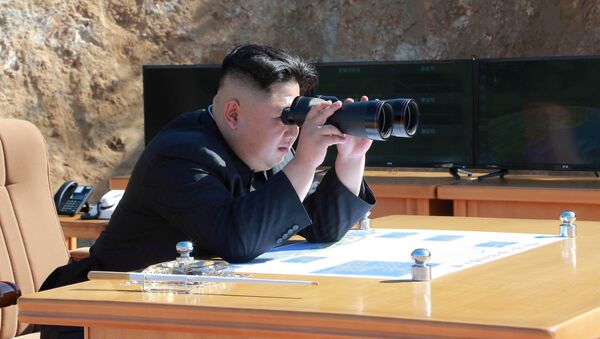The weapons test saw two short-range ballistic missiles fired eastward into the Sea of Japan from the coastal South Hamgyong Province. The two missiles flew around 267 miles and reached an altitude of 18.6 miles, Sputnik reported, citing the South Korean Joint Chiefs of Staff.
KCNA described the weapon as a "new-type large caliber multiple launch guided rocket system," and said that Kim predicted the system would be "an inescapable distress to the forces becoming a fat target of the weapon."
The Democratic People's Republic of Korea (DPRK) has recently blasted Seoul for its new advanced weapons programs and its continued participation in war games with the United States designed to rehearse a conflict with its northern neighbor, although the South Korean armed forces have reduced their participation in such exercises in recent months in a bid to further reduce tensions between the two Koreas.
A US spokesperson said Thursday that the US military has no plans at present to change the upcoming joint exercise with South Korea.
UN Spokesperson Stephane Dujarric used the occasion Wednesday to urge all sides to return to the bargaining table, which they abandoned when the Hanoi summit fell apart in February.
"For the Secretary-General, this is just another reminder of the importance of restarting talks on the denuclearization of the Korean Peninsula," Dujarric said at a press conference.
South Korean media reported on Wednesday that peace talks may resume again soon after a US Security Council official and his North Korean met in the Demilitarized Zone last week and both sides indicated willingness to pick up where they'd left off.
That weapons test was preceded by the launching of two other short-range ballistic missiles from the same site on July 25, which South Korean defense officials identified as the KN-23. The website Global Security identifies them as a "road-mobile" system first paraded in February 2018. It's unclear if the July 31 weapons test was of the same type, although the South Korean JCS said they were studying data to determine if it was.
While the 1950-53 Korean War ended in a ceasefire, no permanent peace treaty was ever signed, meaning the US and South Korea are still technically at war with the North. Pyongyang has repeatedly called for an end to the conflict and guarantees of peace that would reduce tensions on the peninsula, maintaining its nuclear weapons are only intended as a guarantee of security until then. The US and other powers have demanded the socialist country end its nuclear weapons and ballistic missile programs, and have imposed steep economic punishments on countries trading with North Korea in a bid to force them to denuclearize.
Talks toward that end began in June 2018, but stalled in February 2019 when Washington refused to lower any of those sanctions before Pyongyang had totally destroyed its nuclear weapons program. North Korea then resumed its testing of short-range ballistic missiles in May, which is not in violation of any existing agreements.
During an interview with Fox Business network Wednesday evening, US national security adviser John Bolton affirmed the tests didn't violate Kim's pledge, but he questioned when the two countries would resume negotiations.
"The firing of these missiles don't violate the pledge that Kim Jong Un made to the president about intercontinental-range ballistic missiles," he said. "But you have to ask when the real diplomacy is going to begin, when the working-level discussions on denuclearization will begin, as Kim Jong Un again said on June 30 he was prepared to do. We're still waiting to hear from North Korea."


